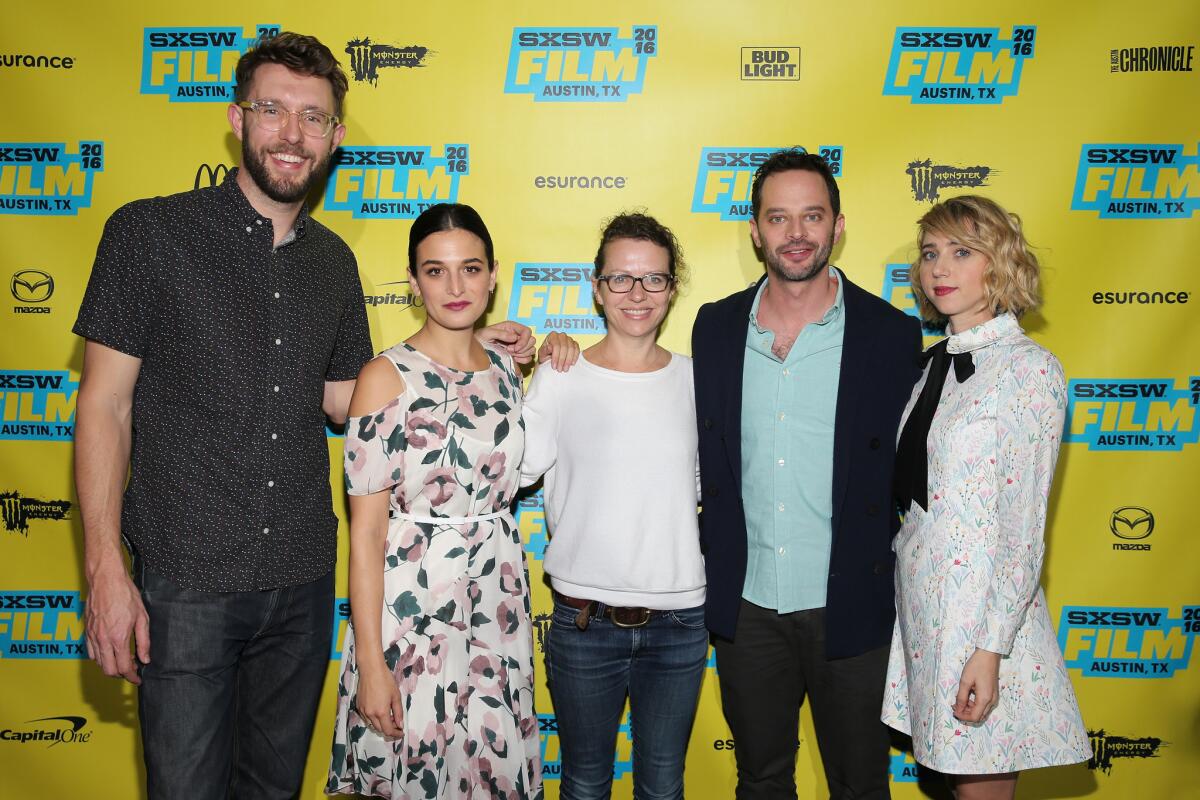Jenny Slate, Nick Kroll and Zoe Kazan at the ‘My Blind Brother’ world premiere at SXSW

Charlie Hewson, from left, Jenny Slate, Sophie Goodhart, Nick Kroll and Zoe Kazan attend the “My Blind Brother” premiere at the South by Southwest festival in Austin, Texas, on Saturday.
- Share via
“My Blind Brother,” Sophie Goodhart’s debut feature as writer and director, is an assured, acerbic look at family, guilt, jealousy, grief and competitiveness. The project began as a short film of the same name starring Tony Hale that debuted at South By Southwest in 2003 before playing other festivals, including Cannes.
The story has been expanded for the feature version, with Adam Scott playing Robbie, a blind athlete whose ultra-competitive nature means he is not above using his impairment to his advantage, especially when it comes to constantly putting down and getting ahead of his brother Bill (Nick Kroll). Bill in turn has tremendously conflicted, complicated feelings about his brother and longs to get out from under his shadow.
Bill and Robbie unexpectedly find themselves competing for the affections of Rose (Jenny Slate), a woman getting over the fact her boyfriend recently died in an accident. She is wracked with guilt that they were in the process of breaking up when it happened.
The film walks a fine line between being a quirky family story and an essay on jealousy and regret, veering between romance and dark comedy. In a Q&A after the film’s world premiere Saturday at South By Southwest, actress Zoe Kazan, who plays Rose’s friend Francie, praised Goodhart’s “control of the comi-tragic tone.”
In a phone interview ahead of the festival from her home in Brooklyn, Goodhart described her intentions by saying, “I like the idea of being unsure of the hero, and the people you are really engaging with are doing what they are doing for selfish, ugly reasons.”
She explained that the film is really a combination of stories. The first has its basis in Goodhart’s own unexpected feelings of jealousy over the attention her sister received after being diagnosed with multiple sclerosis. She then heard of a blind swimmer and his sibling rowboat guide and decided to fuse those stories. She also had the idea of a woman who dumps her boyfriend just before he dies, which recasts her somehow from victim to villain.
“The easy fit of it was seeing how Bill and Rose would connect over these muddy feelings of resentment and guilt,” Goodhart said. “And then it was just a kind of balancing thing of how much do I want to have this kind of sincerity in the love story part of it and how much do I want to play with the discomfort.
“I liked the idea of packaging it in this kind of sugary way so these dark themes slowly release rather than hit you in the face,” she said. “You think you’re watching something kind of sweet and romantic and then hopefully a while later these ideas make us look at our own foibles and attempts to be good and how much we give to others and keep for ourselves.”
In the years since the short, Goodhart has written scripts for other filmmakers and tried to get various projects of her own off the ground.
“Are you looking for a polite way to ask what the … have I been doing?” she said bluntly. (A: Yes.)
She added, “During my 30s, I basically just watched television and wondered why I wasn’t more successful, and then in my 40s I had two children, got married and made my first film.”
The film’s world premiere at the Topfer Theatre seemed well-received, with laughing and applause. Yet perhaps it was the conflicted feelings the film created that sparked an especially off-beat Q&A, as Goodhart was joined on stage by Slate, Kroll and Kazan, as well as actor Charlie Hewson, who plays a blind drug dealer in the film.
The first question from the audience was from a young woman who asked what brands Kazan and Slate were wearing.
“I’m so glad you watched the movie and took away so much,” Kazan said with a withering deadpan.
“Women love to be asked more about their clothes than their work,” Slate said. “We’re dolls, we made a wish to become alive. I’m wearing Suno.”
“And I’m in Vivetta,” added Kazan.
“And this is Old Navy top to bottom,” said Kroll, defusing the moment.
Finally, a question from the audience asked whether anyone onstage had “family members who are handicapped that allowed you to empathize” with the characters in the story.
“Look, I think there’s a reason that ‘differently abled’ is becoming something that people say,” Kazan replied. “Which is that we all have different tool kits that we come with to the world and I think everybody up here has felt like an outsider at certain points and felt special at certain points, and I don’t think you have to have any particular personal experience to feel empathy or that we’re all human and capable of cruelty and capable of kindness.
“I think that Sophie made a really cool movie about people,” Kazan added, “and that the blindness, even though it’s part of the title and obviously part of what the movie is about, is not the front and center of what this movie is really talking about.”
Follow on Twitter: @IndieFocus
MORE:
Seth Rogen brings a bawdy, work-in-progress animated ‘Sausage Party’ to SXSW
‘Miss Stevens’ is a breakthrough for filmmaker Julia Hart and actress Lily Rabe at SXSW
More to Read
Only good movies
Get the Indie Focus newsletter, Mark Olsen's weekly guide to the world of cinema.
You may occasionally receive promotional content from the Los Angeles Times.











